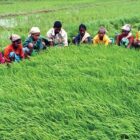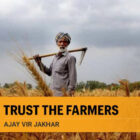Food insecurity stems not from insufficient production but from irrational use and inequitable distribution of resources coupled with inaccessibility to food.
That the RBI governor received a battering for stifling growth due to his refusal to reduce interest rates is half the inflation story. The other half is a horror story. Irrespective of the government, the continuous attempt to rein in inflation by artificially driving down food prices, and its consequences for the farmer, escapes scrutiny. Over the last decade the government actions systematically subdued farm gate prices received by farmers for their produce by over ₹10 lakhs crores. The sum far exceeds the farm input support provided for the same period.
Apart from dreadful export bans (wheat, rice, cotton, onions, potatoes and other produce) and imports (edible oil, butter oil, pulses, maize, onions and such others) farmers are rattled by the hair-brained response to the pulse shortage. The government plans to explore the prospects of growing pulses in Africa to meet domestic demand. Yet, ‘Make in India’ is the national agenda! Also the commerce ministry has now approved import of 5 lakh mt of maize. Inversely, foreign investments are being sought in the animal husbandry and dairy sectors where co-operatives and unorganised farmers are suffering from low prices because of over-production even in the worst drought years. Such moves will destroy the crucial component of the livelihood for most farmers.
One is reminded of a legendary Alexander the Great asking if he could fulfil a desire of the Greek philosopher Diogenes of Sinope. “Stand out of my sun light”, Diogenes had replied. Similarly if policy-makers just stood aside, farmers could hope to prosper in the sunlight too. There is no escaping the reality that inflation needs to be controlled. Similarly, economist’s stand accused of conspiring to remain silent on the issue that ‘as long as farmers are used as the primary instrument for controlling food inflation, they will need to be supported’.
India’s obsession with instruments of support while losing sight of the objective of equitable development has been responsible for farmers committing suicides every day. Amidst this turmoil there is the ongoing Niti Aayog consultations to prepare a 15-year vision document, which must grasp the basic facts. Irrespective of what is done, a majority of farm holdings will remain small while every farmer household will be sustained by at least one member working in an off-farm job.
It is also clear that commodity volatility due to extreme weather events will be the new normal. India’s population will stabilise in 15 years and economic prosperity will change food habits and drive production choices for farmers. Notwithstanding these future challenges, India has the ability to grow enough to feed itself in nine out of 10 years.
It is apparent that food insecurity stems not from insufficient production but from irrational use and inequitable distribution of resources coupled with inaccessibility to food. For too long, has the larger section of the society been kept in poverty to sustain the rest. This is why murmurs of a ‘Farmers Income Guarantee’ are gathering a voice and could become the potential game changer in 2019.
Political parties are oblivious of the obvious. The government vision must embrace the aspirations of the majority. Paying lip service to the plight of 90 million farmer families may no longer be a political option.




